The Council of the European Union will make a final decision on whether to name the new global EU sanctions regime for human rights violations after Russian opposition figure Alexey Navalny, similar to the United States' Magnitsky list, European Commission Spokesperson Dana Spinant said at a briefing on Monday
BRUSSELS (Pakistan Point News / Sputnik - 22nd September, 2020) The Council of the European Union will make a final decision on whether to name the new global EU sanctions regime for human rights violations after Russian opposition figure Alexey Navalny, similar to the United States' Magnitsky list, European Commission Spokesperson Dana Spinant said at a briefing on Monday.
Earlier in September, speaking to members of the European Parliament, EU foreign policy chief Josep Borrell proposed naming the emerging European global sanctions regime on human rights after Navalny.
"I think, it is a very interesting discussion that was started by the high representative. I think that the Commission will leave the field open when it comes to the name that this act is given. And if Navalny is appropriate, the Council, which is responsible for the final adoption, if the Council feels that this is the appropriate name then we will remain open, we wait suggestions," the spokeswoman said.
Navalny fell ill during a domestic flight in Russia on August 20. He was initially treated in the Siberian city of Omsk, where the plane had to urgently land. Two days later, once the doctors established he was fit for cross-border aerial transportation, the 44-year-old was flown to the Berlin-based Charite clinic for further treatment.
The German government said doctors claimed they had proof Navalny was poisoned with a nerve agent from the Novichok group of toxins. According to Berlin, the conclusions of its doctors were confirmed by laboratories in France and Sweden.
Tests in Russia did not show traces of poison in Navalny's system. Moscow has demanded that Germany provide evidence to back up its claims, but has not yet received any.




